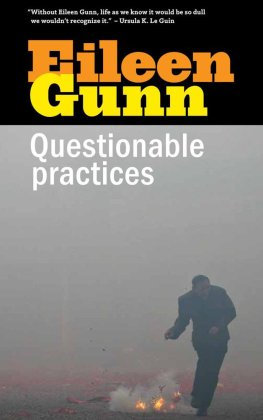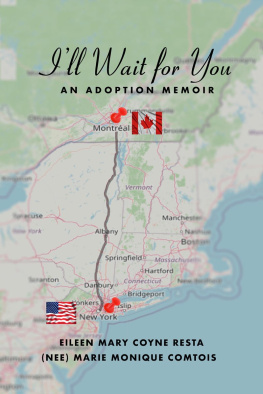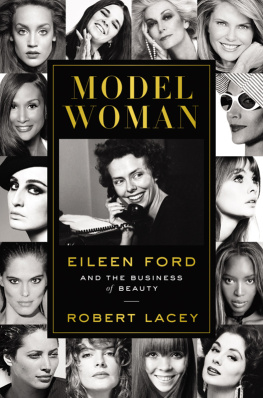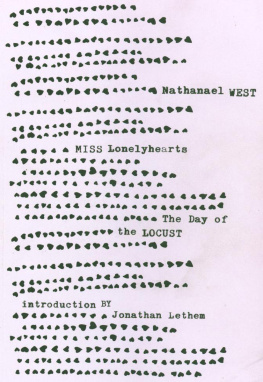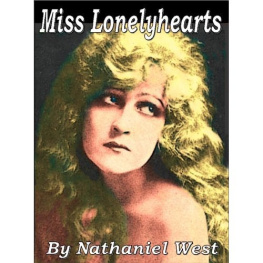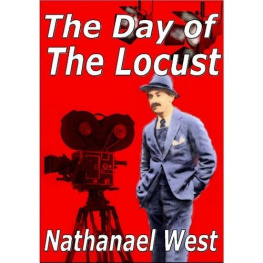First Mariner Books edition 2011
Copyright 2010 by Marion Meade
All rights reserved
For information about permission to reproduce selections from this book, write to Permissions, Houghton Mifflin Harcourt Publishing Company, 215 Park Avenue South, New York, New York 10003.
www.hmhco.com
The Library of Congress has cataloged the print edition as follows:
Meade, Marion, date.
Lonelyhearts : the screwball world of Nathanael West and Eileen McKenney / Marion Meade.
p. cm.
Includes bibliographical references.
ISBN 978-0-15-101149-0
1. West, Nathanael, 19031940. 2. Authors, American20th centuryBiography. 3. McKenney, Eileen, d. 1940. I. Title.
PS 3545. E 8334 Z 822 2009
813'.52dc22
[ B ] 2009013285
e ISBN 978-0-547-48867-7
v2.1114
Photo credits appear on .
Once again for Alison, Ashley, and Katharine
Wildly funny, desperately sad, brutal and kind, furious and patient, there was no other like Nathanael West.
DOROTHY PARKER
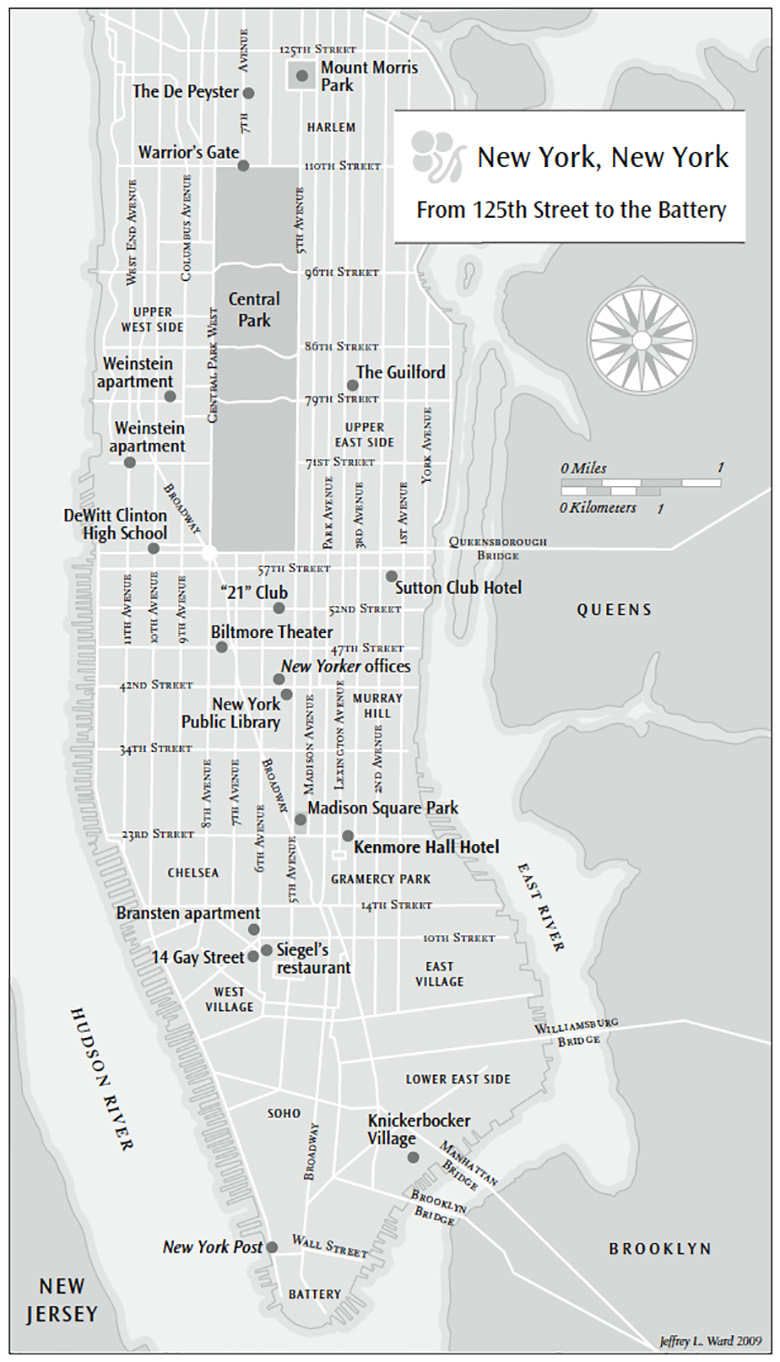
The Ensemble
LEADS
N ATHAN W EINSTEIN, AKA N ATHANAEL W EST high school dropout, candy maker, hotel manager, passionate hunter of doves, novelist who sets his stories in locations such as a horses bowels and the Hollywood dream dump
E ILEEN M C K ENNEY one of two Ohio sisters who move to Manhattan and live in a basement apartment; accidental muse known to the public as my sister Eileen
S IDNEY J. P ERELMAN son of a failed chicken farmer, now writer-cartoonist, one of Nats college friends and later brother-in-law
R UTH M C K ENNEY sister of Eileen, whose humorous stories about her Cleveland family draw an enthusiastic response from Depression-era audiences
SUPPORTING PLAYERS
J ULIAN S HAPIRO, AKA J OHN S ANFORD Nats boyhood friend from Harlem, later a lawyer-writer
Q UENTIN R EYNOLDS a sometime lovelorn columnist, war correspondent, Nats classmate at Brown
K ATHARINE S ERGEANT A NGELL W HITE New Yorker fiction editor, also the person responsible for discovering Ruth McKenney
S T . C LAIR M C K ELWAY charming New Yorker writer-editor and Eileens companion
L ORRAINE (L AURA ) W EINSTEIN Nats youngest sister who marries Sidney Perelman
J OSEPHINE H ERBST kind-hearted novelist who introduces Nat to Bucks County
WALK-ONS
S TANLEY R OSE bookseller
B ENNETT C ERF publisher
D ANNY , J ULIE , G URKE, AND A STA animals
B EATRICE M ATHIEU AND A LICE S HEPARD fiances
M ORRIS J ACOBS AND R ICHARD B RANSTEN husbands
E DMUND W ILSON , L ILLIAN H ELLMAN , J OHN OH ARA , J OSEPH S CHRANK , F. S COTT F ITZGERALD , R OBERT C OATES , D ASHIELL H AMMETT , B UDD S CHULBERG , J EROME C HODOROV , J OSEPH F IELDS literati
O THERS a corps of neurotics
Introduction
I N THE WANING DAYS of the Depression, on the evening of December 26, 1940, a comedy premiering at the Biltmore Theater in New York earned unanimous raves, exploding it into the Broadway firmament. Few of the glowing reviews for My Sister Eileen mentioned that the shows true-life heroine had been killed with her husband in a car crash four days earlier. Eileen McKenney had achieved a certain stardom in her sisters New Yorker tales, whereas her husband, the author of four slender novels and a score of B movies, was relatively unknown to the general public; none of his books had sold well. A writer ahead of his time, Nathanael West created psychologically complex antiheroes and violent, pitch-dark fictions that he (but few others) called comic novels. His rude messageguess what, folks, the American Dream is a scamwasnt too popular either. A provocateur at heart, he was happiest swimming against the tide.
Not until after the Second World War, in that post-A-bomb, Dr. Strangelove era, did Wests brand of nightmare humor find an appreciative audience. His novels were first collected in 1957 by Farrar, Straus & Cudahy, and the Library of America would follow some forty years later by adding his complete works to its canon of classic American literature. As Number 93, he was the first Jewish writer enshrined in an elite pantheon that includes Mark Twain and Nathaniel Hawthorne. Miss Lonelyhearts now is recognized as one of the significant American novels of the twentieth century while The Day of the Locust is credited as the most trenchant book ever written about Hollywood moviemaking.
The story of Nathanael West and Eileen McKenney has never been told, although their individual portraits have been presented in earlier biographies and memoirs. At first glance, it is hard to see any logical connection. They met in the fall of 1939, married the following spring, and wound up dead on the highway on December 22, 1940, when she was just twenty-seven and he was thirty-seven. What does a high-strung New York intellectual have to do with a nonintellectual darling from Ohio? And when is fifteen months enough time to become friends and spouses, much less enjoy the pleasures of a good fight? Only in the turmoil of the 1930s, with its attendant rainbows and banana peels, could two people complement each other so precisely.
Their short lives necessarily leave open the question of what else they might have done. McKenney missed turning forty in the year 1953 and seeing one of the all-time marvelous musicals, Wonderful Town, based on her own story. She never had the opportunity to watch Rosalind Russell belting out Why, oh why, oh why, ohwhy did I ever leave Ohio? Today, McKenney remains a symbol of all the fabled heroines and their real counterparts who migrate to the bright lights in quest of their destinies. West never got to enjoy the rewards that fall to renowned writers. Had his life continued another thirty years, would he have overcome his disillusionment with fiction writing? Would he have found a more satisfying career as a movie and television director or producer?
Their marriage has been called a romance by romantics, a tragedy by those who dote on reasonably happy endings. As we shall see, it was bothand neither. Mr. and Mrs. West were not a Bonnie-and-Clyde jalopy couple although, to a man with Wests outlaw personality, anybody on a crime spree could not be all bad. In Westian parlance, their story had a twisteroo punch line, proving that anything can happen, and sometimes does.
In the Hotel
SUNDAY, MARCH 16, 1930
T HE LOBBY OF the Kenmore Hall Hotel was deserted at three in the morning. Its skylit lounge was shrouded in pearl shadows, the passenger lift stood wearily at attention, the night porter dozed in the vestibule. Sitting behind the front desk was the assistant manager, a long-legged youth of twenty-six in a Brooks Brothers, three-button wool suit. On this night he bent over the keyboard of a typewriter, pounding out a letter to his girlfriend, Beatrice, in Paris and puffing on a cigarette. Nothing happens, he wrote.
Kenmore Hall, a pretty redbrick residence hotel not yet two years old, was home to hundreds of young professionals who booked by the week or month. Prized for its desirable address near Gramercy Park, its reasonable rates, and amenities such as a pool and roof garden, the place always had a waiting list for vacancies, sometimes a long one. Nat was supposed to remember guests names, but he happened to know a great deal more, and not just gossip either. He knew exactly when they awoke and when they left for their offices, who got mail and from whom, what time they went to bed, and which ones couldnt sleep, because the bleary-eyed were known to shuffle down to the lobby and fret about it, as if he could do anything. There were friendly women who found pretexts for inviting him to their rooms. To all proposals he would beg off with an easy smile and a general refusal worded to give no offense. He took fewer pains with the prostitutes, alone or in pairs, who constantly tried to sneak past the desk on their way to the elevator. Hookersand stolen bath towelswere his biggest aggravations.
Next page

